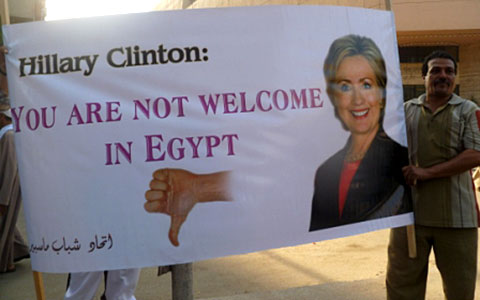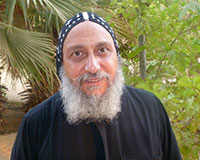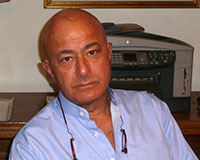Egypt: Copts split over Christian boycott of Clinton over support for ‘Islamo-fascism’ in Middle East
by - 1st August 2012

US Secretary of State Hillary Clinton declared religious freedom in Egypt to be ‘quite tenuous’ following the release of the 2011 International Religious Freedom Report. Despite chronicling several instances of sectarian violence against Coptic Christians, their community finds itself increasingly divided over its longstanding support for America.
At issue is Clinton’s alleged support for the nation’s first Islamist president, Mohamed Morsy.
The Orthodox Church and Coptic politicians boycotted a recent meeting with Clinton as she visited the fledgling democracy. Some Copts, meanwhile, demonstrated at the US Embassy against her visit.
‘We believe there is an alliance between the Obama administration and the Muslim Brotherhood, which supports fascism in the Middle East,’ said Bishoy Tamry, a leader in the primarily Coptic Maspero Youth Union, formed following post-revolution attacks on Cairo churches.
‘The US thinks the Brotherhood will protect their interests in the region but it will be over our bodies as minorities.’
President Morsy won a highly contested election rife with rumours of fraud and behind the scenes negotiation between the Brotherhood, Egypt’s military council, and the United States.
‘We knew the next president must have US support,’ said Tamry, ‘because the military council rules Egypt and the US pays the military council.’
Egypt receives $1.3 billion annually in US military aid, compared with $250 million in economic assistance.
Yet, according to Youssef Sidhom, editor-in-chief of the Coptic newspaper Watani, Copts have been disproportionately affected by these rumours.
‘Copts fell victim to the conspiracy theory that said Morsy did not win and Shafik [his opponent] was in the lead. I found no compelling evidence of this conspiracy.’
Nevertheless, Copts find reason to believe the US is taking sides in an Egyptian political question. Muslim Brotherhood deputy leader Khairat al-Shater stated his group’s priority is a ‘strategic partnership’ with the United States.
Clinton, meanwhile, urged President Morsy to assert the ‘full authority’ of his office. Egypt is currently undergoing a struggle between the Brotherhood and the military council over the political transition to democracy.
 Bishop Thomas of the Coptic Orthodox Church told Lapido Media, ‘We did not meet with Clinton because of the unclear relationship with the Brotherhood and the support they have given it.
Bishop Thomas of the Coptic Orthodox Church told Lapido Media, ‘We did not meet with Clinton because of the unclear relationship with the Brotherhood and the support they have given it.
‘Things are not settled in Egypt,’ he said. ‘Why was she in such a hurry to come?
‘The current administration does not understand the agenda of the Brotherhood which has been clear for decades – to revive the caliphate and apply shariah law.’
Emad Gad is one of two Copts elected to the now dissolved parliament. He received an invitation to meet with Clinton, but refused.
‘In exchange for Morsy's being named president,’ he said, ‘the Brotherhood is expected to protect Israel's security by pressuring Hamas – the Brotherhood's branch in Palestine – not to launch military attacks against Israel, and even accept a peace agreement with Tel Aviv.’
 Sameh Makram Ebeid, the second Coptic parliamentarian, gives a different emphasis. Though not invited to the meeting with Clinton, he agreed with the refusal of Gad and other Coptic politicians.
Sameh Makram Ebeid, the second Coptic parliamentarian, gives a different emphasis. Though not invited to the meeting with Clinton, he agreed with the refusal of Gad and other Coptic politicians.
He told Lapido: ‘There are two objections to her visit. The liberal forces say – true or false I don’t know – the Americans were in cahoots with the Brotherhood and handed them the country.
‘The second is that you should not meet with the Copts as Copts, but as part of the liberal movement, as the third way between military and Islamist.
‘She wanted to meet with individual liberal politicians, but they were all Christians,’ he said. ‘If you start segregating the country you’re making a big mistake.’
Segregating and dividing the country was also a concern of Revd. Safwat el-Baiady, president of the Protestant Council of Churches. In an interview with Lapido, he said the Orthodox clergy withdrew from the meeting only one hour before it started, but that Protestants, Catholics, and Orthodox laity attended.
Baiady told Clinton of Coptic fears of a repetition of Iraq, where Christians fled the country following American interference. He also spoke of Egyptian concerns the US would divide Egypt, especially the Sinai, using it as a solution for the problem of Hamas.
‘She is a good listener and took many notes,’ said Mr Baiady.
‘Clinton said we have to back the winners and those who lead the country. They have the best organization and power on the ground, based on the parliamentary elections.
‘We have to support the people, she said, and not oppose them.’
Raed Sharqawi, a reporter present at the Coptic demonstration, agrees with Clinton.
‘America has relations with every nation in the world,’ he said. ‘The US is also the shield for the Copts, and always will be. This protest is foolish.’
As Egypt’s transition muddles forward, there is ample room for confusion. The military and the Brotherhood emerged as the two strongest forces, making Copts wonder about their future. Within this mix, Clinton’s visit in support of Morsy has led to this near unprecedented rupture in Coptic-American relations.
‘The US will make us into another Pakistan,’ said Tamry as the protest continued. ‘We have come to say don’t interfere in our business.’
- Log in to post comments
